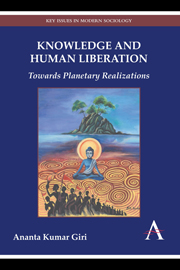Book contents
- Frontmatter
- Contents
- Preface
- Acknowledgments
- Foreword
- Introduction: The Calling of Transformative Knowledge
- Part I Nurturing the Garden of Transformational Knowledge: Roots and Variants
- Part II Rethinking Knowledge
- Part III Aspirations and Struggles for Liberation: Towards Planetary Realizations
- Afterword
- Advance Praise
Afterword
Published online by Cambridge University Press: 05 May 2013
- Frontmatter
- Contents
- Preface
- Acknowledgments
- Foreword
- Introduction: The Calling of Transformative Knowledge
- Part I Nurturing the Garden of Transformational Knowledge: Roots and Variants
- Part II Rethinking Knowledge
- Part III Aspirations and Struggles for Liberation: Towards Planetary Realizations
- Afterword
- Advance Praise
Summary
A transformative sociology? A transformative and transforming “knowledge” of social life? These phrases are signature notions of Ananta Kumar Giri. In a string of earlier publications, he has provided sketches adumbrating these notions. Now, in the present volume, he finally has enlisted all his rich intellectual resources in order to flesh out the meaning of an active kind of “knowledge” capable of promoting human “liberation” or emancipation. As one should note, liberation for Giri does not just denote deliverance from oppressive social and political structures, but also the overcoming of inner compulsions and addictions standing in the way of genuine human freedom. To this extent, liberation as used in this volume resonates with Gandhi's notion of self-rule (Swaraj) and also, more distantly, with the notion of “cura sui” as cultivated by the Roman Stoics.
Still, one may ask: a transformative and liberating “knowledge”? Does knowledge not always precede transformative practice? Does one not first have to know what it is that one wishes to change or liberate? As one can readily see, these questions lead back to an old philosophical conundrum that can be traced from the Greeks (especially Aristotle) down to Hegel and Marx: the so-called “theory-practice” nexus. Different philosophical traditions give different answers to this conundrum. In large measure, modern Western rationalism – from Descartes to Kant – places the accent squarely on knowledge or cognition, even a purely “transcendental” cognition entirely removed from practical or experiential contexts.
- Type
- Chapter
- Information
- Knowledge and Human LiberationTowards Planetary Realizations, pp. 303 - 306Publisher: Anthem PressPrint publication year: 2013

